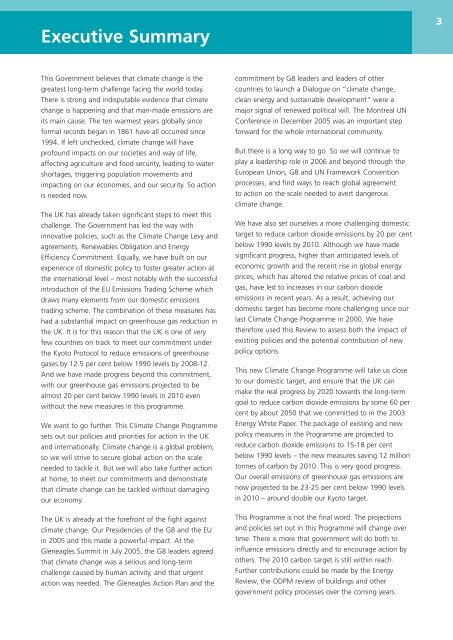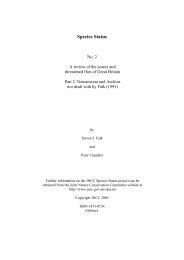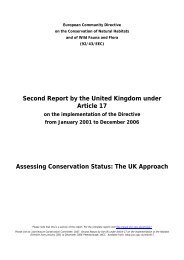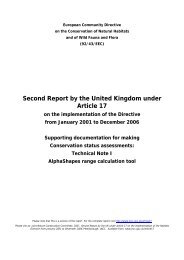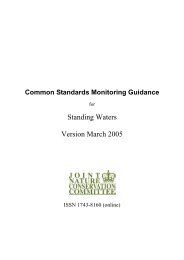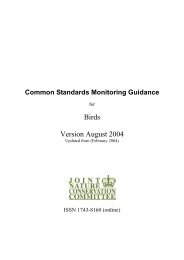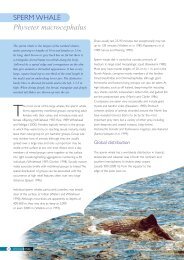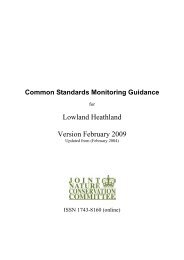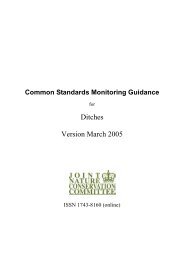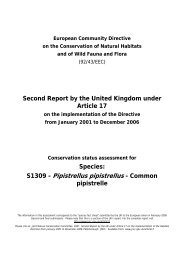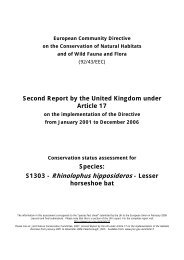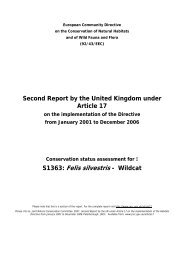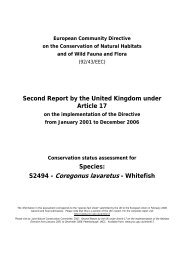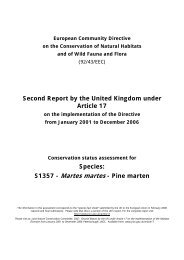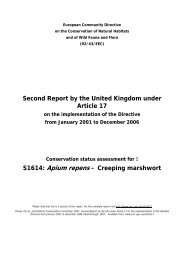UK Climate Change Programme 2006 - JNCC - Defra
UK Climate Change Programme 2006 - JNCC - Defra
UK Climate Change Programme 2006 - JNCC - Defra
Create successful ePaper yourself
Turn your PDF publications into a flip-book with our unique Google optimized e-Paper software.
Executive Summary Executive Summary<br />
3<br />
This Government believes that climate change is the<br />
greatest long-term challenge facing the world today.<br />
There is strong and indisputable evidence that climate<br />
change is happening and that man-made emissions are<br />
its main cause. The ten warmest years globally since<br />
formal records began in 1861 have all occurred since<br />
1994. If left unchecked, climate change will have<br />
profound impacts on our societies and way of life,<br />
affecting agriculture and food security, leading to water<br />
shortages, triggering population movements and<br />
impacting on our economies, and our security. So action<br />
is needed now.<br />
The <strong>UK</strong> has already taken significant steps to meet this<br />
challenge. The Government has led the way with<br />
innovative policies, such as the <strong>Climate</strong> <strong>Change</strong> Levy and<br />
agreements, Renewables Obligation and Energy<br />
Efficiency Commitment. Equally, we have built on our<br />
experience of domestic policy to foster greater action at<br />
the international level – most notably with the successful<br />
introduction of the EU Emissions Trading Scheme which<br />
draws many elements from our domestic emissions<br />
trading scheme. The combination of these measures has<br />
had a substantial impact on greenhouse gas reduction in<br />
the <strong>UK</strong>. It is for this reason that the <strong>UK</strong> is one of very<br />
few countries on track to meet our commitment under<br />
the Kyoto Protocol to reduce emissions of greenhouse<br />
gases by 12.5 per cent below 1990 levels by 2008-12.<br />
And we have made progress beyond this commitment,<br />
with our greenhouse gas emissions projected to be<br />
almost 20 per cent below 1990 levels in 2010 even<br />
without the new measures in this programme.<br />
We want to go further. This <strong>Climate</strong> <strong>Change</strong> <strong>Programme</strong><br />
sets out our policies and priorities for action in the <strong>UK</strong><br />
and internationally. <strong>Climate</strong> change is a global problem,<br />
so we will strive to secure global action on the scale<br />
needed to tackle it. But we will also take further action<br />
at home, to meet our commitments and demonstrate<br />
that climate change can be tackled without damaging<br />
our economy.<br />
The <strong>UK</strong> is already at the forefront of the fight against<br />
climate change. Our Presidencies of the G8 and the EU<br />
in 2005 and this made a powerful impact. At the<br />
Gleneagles Summit in July 2005, the G8 leaders agreed<br />
that climate change was a serious and long-term<br />
challenge caused by human activity, and that urgent<br />
action was needed. The Gleneagles Action Plan and the<br />
commitment by G8 leaders and leaders of other<br />
countries to launch a Dialogue on “climate change,<br />
clean energy and sustainable development” were a<br />
major signal of renewed political will. The Montreal UN<br />
Conference in December 2005 was an important step<br />
forward for the whole international community.<br />
But there is a long way to go. So we will continue to<br />
play a leadership role in <strong>2006</strong> and beyond through the<br />
European Union, G8 and UN Framework Convention<br />
processes, and find ways to reach global agreement<br />
to action on the scale needed to avert dangerous<br />
climate change.<br />
We have also set ourselves a more challenging domestic<br />
target to reduce carbon dioxide emissions by 20 per cent<br />
below 1990 levels by 2010. Although we have made<br />
significant progress, higher than anticipated levels of<br />
economic growth and the recent rise in global energy<br />
prices, which has altered the relative prices of coal and<br />
gas, have led to increases in our carbon dioxide<br />
emissions in recent years. As a result, achieving our<br />
domestic target has become more challenging since our<br />
last <strong>Climate</strong> <strong>Change</strong> <strong>Programme</strong> in 2000. We have<br />
therefore used this Review to assess both the impact of<br />
existing policies and the potential contribution of new<br />
policy options.<br />
This new <strong>Climate</strong> <strong>Change</strong> <strong>Programme</strong> will take us close<br />
to our domestic target, and ensure that the <strong>UK</strong> can<br />
make the real progress by 2020 towards the long-term<br />
goal to reduce carbon dioxide emissions by some 60 per<br />
cent by about 2050 that we committed to in the 2003<br />
Energy White Paper. The package of existing and new<br />
policy measures in the <strong>Programme</strong> are projected to<br />
reduce carbon dioxide emissions to 15-18 per cent<br />
below 1990 levels – the new measures saving 12 million<br />
tonnes of carbon by 2010. This is very good progress.<br />
Our overall emissions of greenhouse gas emissions are<br />
now projected to be 23-25 per cent below 1990 levels<br />
in 2010 – around double our Kyoto target.<br />
This <strong>Programme</strong> is not the final word. The projections<br />
and policies set out in this <strong>Programme</strong> will change over<br />
time. There is more that government will do both to<br />
influence emissions directly and to encourage action by<br />
others. The 2010 carbon target is still within reach.<br />
Further contributions could be made by the Energy<br />
Review, the ODPM review of buildings and other<br />
government policy processes over the coming years.


